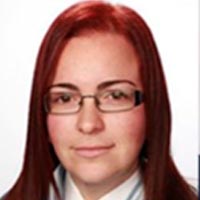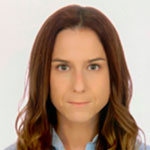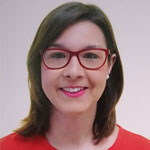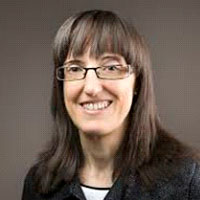Master's Degree in Language Development and Communication

This Master directly raises the scientific basis of language in comparison with the current epistemological criterion of science, especially in the field of humanities
The University Master's Degree in Language Development and Communication Difficulties from Nebrija University is a specialization, of an academic and research nature, in relation to research on assessment, analysis, detection and its application to intervention for Language development and its possible alterations.
The proposal revolves around three axes: the analysis of linguistic, oral and written skills, the process of development and learning of speech, language and communication and, lastly, the examination of the latest scientific contributions, coming primarily from the area of neurosciences, in relation to its influence to stimulate language development and intervention in communication disorders.
This degree comes from the need to harmonize the contributions made from different fields of work (speech therapy, psychology, pedagogy, medicine, education, etc.), with the ultimate goal of offering an adequate multidimensional response, which brings together the most relevant contributions observed in the area and allow a coordinated response, based on scientific knowledge, to the diversity found in the population that presents difficulties in the acquisition and correct development of speech, language and communication.
Program that directly outlines the scientific basis of language in comparison with the current epistemological criterion of science, especially in the field of the humanities.
Student Profile: Those interested in studying and obtaining the University Master's Degree in Language Development and Communication Difficulties from the Antonio de Nebrija University must comply with the requirements established by current legislation, with the admission profile being that of a university graduate or equivalent (bachelor, associate or master's) of degrees in the educational field: Early Childhood or Primary Education, or Pedagogy, or Psychopedagogy. Likewise, given the multidisciplinary nature of the program, those students who have completed the Master's Degree in Teacher Training for Compulsory Secondary Education and Baccalaureate, VT and Language Teaching, or the Teaching Aptitude Certificate (CAP) will be able to access the Master's degree.
Graduate Profile: The objective of the program is academic specialization in relation to the assessment, analysis, detection and its application to the intervention of the latest scientific advances in relation to the development of language and its possible alterations. It will provide graduates with sufficient competences for the analysis of linguistic, oral and written skills, and the processes involved in them, as well as to interpret the process of development and learning of speech, language and communication. Lastly, graduates will be able to integrate this knowledge, and design research in the area.
Official Degree:Master’s Degree in Language Development and Communication Difficulties
Center responsible:School of Language and Education
Branch of knowledge: Social and Legal Sciences
Total Credits: 60 ECTS credits.
Minimum of 30 ECTS credits and maximum of 60 ECTS credits per enrollment and academic period.
Part-time students: Minimum ECTS: 12 Maximum ECTS: 30
Openings available:200
Academic year it was implanted:2021/2022
Duration: 1 year
Academic Regulations: General student’s regulations. Credit transfer and recognition. Regulation of student participation. Common procedures for carrying out the Final Research Project
University Services: [+info]
Internal Quality Assurance System System managers Incidents, Suggestions and Complaints Job placement report and assessment of training received
Program that promotes the collaborative work of all professionals involved in the management of attention to diversity
Curriculum
All our degrees and curricula have been prepared in accordance with the new guidelines set by current legislation, having already been verified by the National Agency for Quality Assessment.
he student must take 60 credits
Subjects 42 ECTS
First semester- 4 ECTS | New trends in Cognitive Neuroscience and language
- 4 ECTS | Learning of speech, language and communication
- 4 ECTS | Difficulties in learning to read
- 4 ECTS | Voice, articulation, and fluency alterations
- 4 ECTS | Written language alterations
- 4 ECTS | Language and learning difficulties
- 4 ECTS | Advances in language and communication assessment
- 4 ECTS | Advances in intervention on oral language and communication pathologies
Second semester- 4 ECTS | Research and Language: The Scientific Method
- 6 ECTS | Research design and data analysis
Internship and Final Research Project 18 ECTS
Second semester- 6 ECTS | Internship
- 12 ECTS | Final Research Project
Professors
 María Emilia Samit Francés
Profesora
Professor
Licenciada en Psicología, especialidad en Clínica; y en Ciencias religiosas; entre su formación de postgrado cuenta con másteres y actualmente un doctorado internacional en Ciencias de la Salud en la Universidade Federal do Rio Grande (FURG – Brasil) en convenio con la Universidad Católica de Santa Fe (UCSF – Argentina). Se desempeña como neuropsicóloga en INECO Neurociencias, Centro de evaluación, diagnóstico y tratamiento de patologías neurológicas, con Acreditación internacional de calidad CARF, donde también es Coordinadora Académica. Profesora universitaria desde el 2008, actualmente es Profesora Titular y Coordinadora de la carrera de Psicología en la Universidad Católica de Santa Fe (UCSF – Argentina), Profesora de Máster en la Universidad del Atlántico Medio (UNIDAM – España) y en la Universidad Antonio de Nebrija (España). Investigadora becada por ICALA (Intercambio Cultural Alemán Latinoamericano). Ha formado parte de proyectos de investigación interdisciplinarios e interuniversitarios, siendo colaboradora asidua en foros y formación de educadores.
María Emilia Samit Francés
Profesora
Professor
Licenciada en Psicología, especialidad en Clínica; y en Ciencias religiosas; entre su formación de postgrado cuenta con másteres y actualmente un doctorado internacional en Ciencias de la Salud en la Universidade Federal do Rio Grande (FURG – Brasil) en convenio con la Universidad Católica de Santa Fe (UCSF – Argentina). Se desempeña como neuropsicóloga en INECO Neurociencias, Centro de evaluación, diagnóstico y tratamiento de patologías neurológicas, con Acreditación internacional de calidad CARF, donde también es Coordinadora Académica. Profesora universitaria desde el 2008, actualmente es Profesora Titular y Coordinadora de la carrera de Psicología en la Universidad Católica de Santa Fe (UCSF – Argentina), Profesora de Máster en la Universidad del Atlántico Medio (UNIDAM – España) y en la Universidad Antonio de Nebrija (España). Investigadora becada por ICALA (Intercambio Cultural Alemán Latinoamericano). Ha formado parte de proyectos de investigación interdisciplinarios e interuniversitarios, siendo colaboradora asidua en foros y formación de educadores.
 Naftalí Paula Veloz
Profesora
Professor
Doctora en investigación en medios de comunicación por la Universidad Carlos III de Madrid. Licenciada en Publicidad y Relaciones Públicas por la Universidad Rey Juan Carlos y Máster en Comunicación y problemas socioculturales por la misma Universidad. Ha cursado estudios relacionados con el marketing, la comunicación corporativa y empresarial y redes sociales. Es especialista en la investigación en medios, análisis de audiencias y diseño de metodologías especialmente para la investigación en prensa y redes sociales. También ha escrito varios capítulos de libros he impartido docencia en la Universidad Protestante de Teología (UEBE) en la asignatura “Teoría y técnicas de la comunicación” y tutorizado TFM en diferentes másteres de la Universidad de Nebrija.
Naftalí Paula Veloz
Profesora
Professor
Doctora en investigación en medios de comunicación por la Universidad Carlos III de Madrid. Licenciada en Publicidad y Relaciones Públicas por la Universidad Rey Juan Carlos y Máster en Comunicación y problemas socioculturales por la misma Universidad. Ha cursado estudios relacionados con el marketing, la comunicación corporativa y empresarial y redes sociales. Es especialista en la investigación en medios, análisis de audiencias y diseño de metodologías especialmente para la investigación en prensa y redes sociales. También ha escrito varios capítulos de libros he impartido docencia en la Universidad Protestante de Teología (UEBE) en la asignatura “Teoría y técnicas de la comunicación” y tutorizado TFM en diferentes másteres de la Universidad de Nebrija.
 Tania Cuervo Rodríguez
Profesora
Professor
Diplomada en Magisterio de Educación Especial y Licenciada en Pedagogía. Ha realizado un Máster en Intervención e Investigación Socioeducativa y, en el año 2019, ha defendido su tesis doctoral dentro del programa de Doctorado en Educación y Psicología, en el que ha obtenido la mención Cum Laude. Todo ello en la Universidad de Oviedo. Así mismo, se ha ido formando a lo largo de los años realizando cursos específicos complementarios como el demExperta en Programación Didáctica y Metodologías Innovadoras en la Universidad Pablo demOlavide. Está especializada en el ámbito social y, concretamente, en Discapacidad Intelectual. Ha impartido docencia en varias universidades nacionales en asignaturas tales como “Educación Personalizada”, “Niveles de Intervención en Atención Temprana” y “Sociedad, Familia y Educación”. Además, ha tutorizado diversos Trabajos Fin de Máster en diferentes másteres de carácter socioeducativo.
Tania Cuervo Rodríguez
Profesora
Professor
Diplomada en Magisterio de Educación Especial y Licenciada en Pedagogía. Ha realizado un Máster en Intervención e Investigación Socioeducativa y, en el año 2019, ha defendido su tesis doctoral dentro del programa de Doctorado en Educación y Psicología, en el que ha obtenido la mención Cum Laude. Todo ello en la Universidad de Oviedo. Así mismo, se ha ido formando a lo largo de los años realizando cursos específicos complementarios como el demExperta en Programación Didáctica y Metodologías Innovadoras en la Universidad Pablo demOlavide. Está especializada en el ámbito social y, concretamente, en Discapacidad Intelectual. Ha impartido docencia en varias universidades nacionales en asignaturas tales como “Educación Personalizada”, “Niveles de Intervención en Atención Temprana” y “Sociedad, Familia y Educación”. Además, ha tutorizado diversos Trabajos Fin de Máster en diferentes másteres de carácter socioeducativo.
 Silvia Herrero Roldán
Profesora
Professor
Licenciada en Psicología por la Universidad del País Vasco. Máster en Dirección de Recursos Humanos y doctoranda con mención internacional en Psicología en la línea de investigación “Neurociencia de la cognición y de las emociones” por la Universidad de La Laguna. Es miembro asociado del Instituto Universitario de Neurociencia de la Universidad de La Laguna y colabora como investigadora con el Institute for Social Research de la Universidad de Michigan desde 2018 donde ha realizado diversas estancias de investigación. Experiencia internacional en congresos como el International Meeting of the Psychonomic Society (Holanda), y en workshops como el Genomics for Social Scientists – Epigenetics (Estados Unidos). En la actualidad colabora como docente e investigadora en diversas universidades.
Silvia Herrero Roldán
Profesora
Professor
Licenciada en Psicología por la Universidad del País Vasco. Máster en Dirección de Recursos Humanos y doctoranda con mención internacional en Psicología en la línea de investigación “Neurociencia de la cognición y de las emociones” por la Universidad de La Laguna. Es miembro asociado del Instituto Universitario de Neurociencia de la Universidad de La Laguna y colabora como investigadora con el Institute for Social Research de la Universidad de Michigan desde 2018 donde ha realizado diversas estancias de investigación. Experiencia internacional en congresos como el International Meeting of the Psychonomic Society (Holanda), y en workshops como el Genomics for Social Scientists – Epigenetics (Estados Unidos). En la actualidad colabora como docente e investigadora en diversas universidades.
 Beatriz Romo Morales
Profesora
Professor
Doctora en Pedagogía por la Universidad de Salamanca (USAL). Ha sido beneficiaria de la Beca de Formación de Personal Docente e Investigador (FPI – Junta de Castilla y León) para el desarrollo de su investigación doctoral bajo la supervisión de la profesora Dolores Pérez Grande. Obtuvo Premio Extraordinario de Doctorado. Ha realizado estancias de investigación pre-doctorales en la Universidad de la Sorbona -Cereq- (París) y en la Universidad de Harvard (Boston, EEUU). En el primer caso obtuvo financiación de la Usal, en el segundo fue autofinanciada tras recibir invitación de la Universidad de acogida (Harvard University Faculty of Educación). El proceso de especialización ha sido completado con la realización del Máster en Estudios Interdisciplinares de Género (USAL), así como el Máster en Recursos Humanos (Universidad de Burgos). Además, cuenta con la realización de numerosos cursos de formación y mejora docente (> 2500 horas). Comenzó su experiencia docente en la UNIR (Universidad Internacional de la Rioja) donde impartió las materias: Enseñanza-aprendizaje en contextos multiculturales, Orientación y Tutoría Familiar e Iniciación a la Innovación Docente con un total 21 créditos y ha tutelado más de 60 TFG y TM. También ha formado parte de Comisiones de Evaluación de TFG/TFM como Secretaria o Presidenta de Tribunal. Durante los últimos 3 cursos académicos ha impartido docencia como profesora asociada en la Universidad de Salamanca impartiendo un total de 48 créditos en diversas materias y titulaciones. Continuará el curso académico 2021-22 con la impartición de 18 créditos más. También ha impartido varias asignaturas en el Programa Interuniversitario de la Experiencia de la Universidad de Salamanca y participado en varios Proyectos de Innovación Docente. Su compromiso es lograr una trayectoria docente e investigadora equilibrada. En este sentido, ha participado en tres proyectos de investigación I+D+i financiados por el Plan Nacional. Durante los últimos años, ha publicado 6 artículos en revistas de impacto (SJR, FECYT), más otros que se encuentran en fases avanzadas de revisión y una decena de capítulos de libro de publicación internacional con un total de 7 capítulos indexados en SPI. Pertenece al grupo de investigación MITA (Multiculturalidad, Inmigraciones y Tecnologías Educativas) reconocido por la Universidad de Salamanca. Ha participado como ponente en 9 congresos nacionales e internacionales como ponente invitada y dentro de actividades de transferencia cabe destacar varias conferencias realizadas en distintos municipios dentro del Programa Provincia Universitaria financiado por la Diputación de Salamanca. Su perfil profesional se completa con una experiencia laboral vinculada a la formación y orientación educativa.
Beatriz Romo Morales
Profesora
Professor
Doctora en Pedagogía por la Universidad de Salamanca (USAL). Ha sido beneficiaria de la Beca de Formación de Personal Docente e Investigador (FPI – Junta de Castilla y León) para el desarrollo de su investigación doctoral bajo la supervisión de la profesora Dolores Pérez Grande. Obtuvo Premio Extraordinario de Doctorado. Ha realizado estancias de investigación pre-doctorales en la Universidad de la Sorbona -Cereq- (París) y en la Universidad de Harvard (Boston, EEUU). En el primer caso obtuvo financiación de la Usal, en el segundo fue autofinanciada tras recibir invitación de la Universidad de acogida (Harvard University Faculty of Educación). El proceso de especialización ha sido completado con la realización del Máster en Estudios Interdisciplinares de Género (USAL), así como el Máster en Recursos Humanos (Universidad de Burgos). Además, cuenta con la realización de numerosos cursos de formación y mejora docente (> 2500 horas). Comenzó su experiencia docente en la UNIR (Universidad Internacional de la Rioja) donde impartió las materias: Enseñanza-aprendizaje en contextos multiculturales, Orientación y Tutoría Familiar e Iniciación a la Innovación Docente con un total 21 créditos y ha tutelado más de 60 TFG y TM. También ha formado parte de Comisiones de Evaluación de TFG/TFM como Secretaria o Presidenta de Tribunal. Durante los últimos 3 cursos académicos ha impartido docencia como profesora asociada en la Universidad de Salamanca impartiendo un total de 48 créditos en diversas materias y titulaciones. Continuará el curso académico 2021-22 con la impartición de 18 créditos más. También ha impartido varias asignaturas en el Programa Interuniversitario de la Experiencia de la Universidad de Salamanca y participado en varios Proyectos de Innovación Docente. Su compromiso es lograr una trayectoria docente e investigadora equilibrada. En este sentido, ha participado en tres proyectos de investigación I+D+i financiados por el Plan Nacional. Durante los últimos años, ha publicado 6 artículos en revistas de impacto (SJR, FECYT), más otros que se encuentran en fases avanzadas de revisión y una decena de capítulos de libro de publicación internacional con un total de 7 capítulos indexados en SPI. Pertenece al grupo de investigación MITA (Multiculturalidad, Inmigraciones y Tecnologías Educativas) reconocido por la Universidad de Salamanca. Ha participado como ponente en 9 congresos nacionales e internacionales como ponente invitada y dentro de actividades de transferencia cabe destacar varias conferencias realizadas en distintos municipios dentro del Programa Provincia Universitaria financiado por la Diputación de Salamanca. Su perfil profesional se completa con una experiencia laboral vinculada a la formación y orientación educativa.
 Katia Rolán González
Profesora
Professor
Licenciada en Psicología. Máster en Psicología Jurídica y Forense. Experta en Neurociencia cognitiva y afectiva. Doctora en Psicología. Ha trabajado en Gestión de conflictos y en metodología para la impartición de Docencia desde 2015, compaginándolo con labores de investigación en lenguaje y emoción mediante técnicas de neurociencia. Su línea de investigación principal se ha centrado en la regulación emocional a partir del lenguaje.
Katia Rolán González
Profesora
Professor
Licenciada en Psicología. Máster en Psicología Jurídica y Forense. Experta en Neurociencia cognitiva y afectiva. Doctora en Psicología. Ha trabajado en Gestión de conflictos y en metodología para la impartición de Docencia desde 2015, compaginándolo con labores de investigación en lenguaje y emoción mediante técnicas de neurociencia. Su línea de investigación principal se ha centrado en la regulación emocional a partir del lenguaje.
 Estefanía Lema Moreira
Profesora
Professor
Docente en diversas Universidades (Universidad de Vigo, UNIR, Universidad Antonio de Nebrija, Universidad Camilo José Cela, y Universidad Internacional de Valencia), desde febrero de 2016 hasta septiembre de 2021. Con experiencia profesional en centro de menores, y como psicopedagoga con menores con NEAES. Directora del Grado en Educación Infantil en la Universidad Internacional de Valencia desde el 13/01/2020 hasta el 17/09/2021. Durante este período se ha estructurado el título, se han generado protocolos para mejora de calidad del mismo, se han aumentado los porcentajes de profesores Doctores (pasando de casi 60% hasta más de 80%), así como de docentes a TC, se ha conseguido una evaluación FAVORABLE (limpio, sin comentarios) en Seguimiento de AVAP, etc.
En dicho período he sido IP del grupo de Investigación IIEViF (creadora e IP), cuyo logro más significativo ha sido la propuesta enviada a la convocatoria RETOS del MICINN, con una obtención de 48 puntos (primera ocasión para todos los miembros del grupo, y también para la propia Universidad); miembro de la Comisión de Doctorado.
A nivel investigador poseo diversas publicaciones científicas de alto impacto, focalizadas en competencias digitales, menores en riesgo, familia y genética, principalmente. A su vez, he participado en diversidad de congresos, tanto a nivel nacional como internacional.
Co-fundadora de la startup Ninjamoba (https://www.ninjamoba.com/ con base actual en Malta). Como Ninjamoba hemos participado en el Date4Recovery Hackathon (2021), ganando la categoría de Real-time heath monitoring and remote care con la aplicación SIA (Social Intelligente Assistant, https://eventornado.com/submission/socialintelligence-assitance?s=1#ideas https://youtu.be/F7HikzZ__o4 ); así como el challenge Family life during remote working an education, en el Hackathon EUvsVirus (https:// www.euvsvirus.org/results/). Actualmente, estamos inmersos en el EIT Climate-KIC MED ClimAccelerator, así como en la convocatoria EIC Pathfinder Challenges 2021. A su vez, tenemos un contrato con MCAST, (The Malta College of Arts, Science & Technology, https:// www.mcast.edu.mt/), para el desarrollo de AI en contexto educativo, principalmente. Este segundo producto está en un nivel TRL7, mientras que SIA está en un nivel TR5L/TRL6.
He ejercido como educadora social en viviendas tuteladas de transición a la vida adulta, así como con menores pertenecientes a colectivos de riesgo, principalmente población gitana. Experiencia como psicopedagoga en gabinete privado con menores con NEAES. Miembro de la JD de SEVIFIP, miembro de aBeira (CEESG), miembro de IAN-España, y de APA.
Actualmente, estoy interesada en continuar mi carrera académica de la mano de I+D, pudiendo unir el potencial de Universidad y Empresa, para lograr nuevos proyectos basados en la inteligencia artificial y focalizados en educación, salud y desarrollo sostenible.
Estefanía Lema Moreira
Profesora
Professor
Docente en diversas Universidades (Universidad de Vigo, UNIR, Universidad Antonio de Nebrija, Universidad Camilo José Cela, y Universidad Internacional de Valencia), desde febrero de 2016 hasta septiembre de 2021. Con experiencia profesional en centro de menores, y como psicopedagoga con menores con NEAES. Directora del Grado en Educación Infantil en la Universidad Internacional de Valencia desde el 13/01/2020 hasta el 17/09/2021. Durante este período se ha estructurado el título, se han generado protocolos para mejora de calidad del mismo, se han aumentado los porcentajes de profesores Doctores (pasando de casi 60% hasta más de 80%), así como de docentes a TC, se ha conseguido una evaluación FAVORABLE (limpio, sin comentarios) en Seguimiento de AVAP, etc.
En dicho período he sido IP del grupo de Investigación IIEViF (creadora e IP), cuyo logro más significativo ha sido la propuesta enviada a la convocatoria RETOS del MICINN, con una obtención de 48 puntos (primera ocasión para todos los miembros del grupo, y también para la propia Universidad); miembro de la Comisión de Doctorado.
A nivel investigador poseo diversas publicaciones científicas de alto impacto, focalizadas en competencias digitales, menores en riesgo, familia y genética, principalmente. A su vez, he participado en diversidad de congresos, tanto a nivel nacional como internacional.
Co-fundadora de la startup Ninjamoba (https://www.ninjamoba.com/ con base actual en Malta). Como Ninjamoba hemos participado en el Date4Recovery Hackathon (2021), ganando la categoría de Real-time heath monitoring and remote care con la aplicación SIA (Social Intelligente Assistant, https://eventornado.com/submission/socialintelligence-assitance?s=1#ideas https://youtu.be/F7HikzZ__o4 ); así como el challenge Family life during remote working an education, en el Hackathon EUvsVirus (https:// www.euvsvirus.org/results/). Actualmente, estamos inmersos en el EIT Climate-KIC MED ClimAccelerator, así como en la convocatoria EIC Pathfinder Challenges 2021. A su vez, tenemos un contrato con MCAST, (The Malta College of Arts, Science & Technology, https:// www.mcast.edu.mt/), para el desarrollo de AI en contexto educativo, principalmente. Este segundo producto está en un nivel TRL7, mientras que SIA está en un nivel TR5L/TRL6.
He ejercido como educadora social en viviendas tuteladas de transición a la vida adulta, así como con menores pertenecientes a colectivos de riesgo, principalmente población gitana. Experiencia como psicopedagoga en gabinete privado con menores con NEAES. Miembro de la JD de SEVIFIP, miembro de aBeira (CEESG), miembro de IAN-España, y de APA.
Actualmente, estoy interesada en continuar mi carrera académica de la mano de I+D, pudiendo unir el potencial de Universidad y Empresa, para lograr nuevos proyectos basados en la inteligencia artificial y focalizados en educación, salud y desarrollo sostenible.
 Lucía Sánchez-Huran Díaz
Profesora
Professor
Doctora en Educación (Cum Laude), por la Universidad Autónoma de Madrid (2021), con una tesis titulada “La iniciación profesional docente: las trayectorias personales del profesorado principiante”. Contratada predoctoral (2017-2021) por la UAM en el marco del proyecto I+D+i “La iniciación en el desarrollo profesional docente en la educación obligatoria: de las políticas supranacionales a las trayectorias profesionales” (EDU2015-65743P). Licenciada en Pedagogía por la Universidad Complutense de Madrid (2013). Al finalizar sus estudios, trabajó durante cinco años como técnico y responsable de selección de personal en compañías del ámbito tecnológico. En el curso 2010-2011 disfrutó de una beca Erasmus en la Universidad Paris VIII Vincennes Saint-Denis. Miembro activo del Grupo de Investigación Reconocido sobre Políticas Educativas Supranacionales [UAM/PR020] (GIPES). Además, es secretaria de edición de la revista Journal of Supranational Policies of Education (JoSPoE). Entre sus principales líneas de investigación destacan: profesorado, profesorado principiante y políticas educativas.
Lucía Sánchez-Huran Díaz
Profesora
Professor
Doctora en Educación (Cum Laude), por la Universidad Autónoma de Madrid (2021), con una tesis titulada “La iniciación profesional docente: las trayectorias personales del profesorado principiante”. Contratada predoctoral (2017-2021) por la UAM en el marco del proyecto I+D+i “La iniciación en el desarrollo profesional docente en la educación obligatoria: de las políticas supranacionales a las trayectorias profesionales” (EDU2015-65743P). Licenciada en Pedagogía por la Universidad Complutense de Madrid (2013). Al finalizar sus estudios, trabajó durante cinco años como técnico y responsable de selección de personal en compañías del ámbito tecnológico. En el curso 2010-2011 disfrutó de una beca Erasmus en la Universidad Paris VIII Vincennes Saint-Denis. Miembro activo del Grupo de Investigación Reconocido sobre Políticas Educativas Supranacionales [UAM/PR020] (GIPES). Además, es secretaria de edición de la revista Journal of Supranational Policies of Education (JoSPoE). Entre sus principales líneas de investigación destacan: profesorado, profesorado principiante y políticas educativas.
 Ángela Rodríguez López
Profesora
Professor
Hace 15 años que comencé mi trabajo como logopeda, estudié en la UCM y desde entonces no he parado de formarme y aplicarlo en las sesiones de tratamiento. Empecé mi carrera en un centro de atención temprana. Allí desarrolle una visión en la intervención directa tan amplia que me cambio la perspectiva de todo lo que había estudiado. Me gustaba mucho la creatividad y recursos que había que desarrollar durante las sesiones. Mi carrera continua en el ámbito clínico y educativo, tuve la gran suerte de tratar en estos dos ambientes, ya que podía intervenir en diferentes patologías, distintas necesidades de apoyo, o alteraciones del desarrollo. siempre en un trabajo en equipo. Me formé como terapeuta Gestalt, gracias a eso aprendí técnicas que puedo aplicar en las clases y en las sesiones. Y por supuesto en la intervención con las familias.
Ángela Rodríguez López
Profesora
Professor
Hace 15 años que comencé mi trabajo como logopeda, estudié en la UCM y desde entonces no he parado de formarme y aplicarlo en las sesiones de tratamiento. Empecé mi carrera en un centro de atención temprana. Allí desarrolle una visión en la intervención directa tan amplia que me cambio la perspectiva de todo lo que había estudiado. Me gustaba mucho la creatividad y recursos que había que desarrollar durante las sesiones. Mi carrera continua en el ámbito clínico y educativo, tuve la gran suerte de tratar en estos dos ambientes, ya que podía intervenir en diferentes patologías, distintas necesidades de apoyo, o alteraciones del desarrollo. siempre en un trabajo en equipo. Me formé como terapeuta Gestalt, gracias a eso aprendí técnicas que puedo aplicar en las clases y en las sesiones. Y por supuesto en la intervención con las familias.
 Silvia Castellanos Cano
Profesora
Professor
Doctora en Psicología por la Universidad de Oviedo. Máster de Investigación en Psicología de Salud. Autora de diversos artículos sobre Personalidad Eficaz, Procesamiento Estratégico de la Información, elaboración de cuestionarios y aprendizaje multimedia. Doctora Internacional en Psicología por la Universidad de Oviedo (2014). Máster Universitario de Investigación en Psicología de la Salud (2010). En cuanto a la trayectoria profesional impartición de docencia en la Universidad de Psicología de Oviedo (2009-2014), la Universidad internacional de la Rioja (2015-2019), La Universidad Antonio de Nebrija (2019-2021), y la Universidad Camilo José Cela (2019-2021). Desempeño de otros puestos como directora Adjunta en Centro de día (2017- 2018) y Coordinadora de proyectos pedagógicos de Centros de Formación de Asturias (2018-actualidad) y Psicóloga de Centro de día (2021-actualidad). Participación en proyectos de investigación sobre la personalidad eficaz, altas capacidades con la Universidad de Oviedo y APADAC (Asociación de padres de Alumnos De Altas Capacidades- APADAC) y de “Asistencia y dirección en los procesos de gestión, planificación, investigación, y redacción de trabajos conducentes” en la Universidad de Oviedo. Realizó Instancia investigativa en la subsecretaría, Área de Desarrollo curricular, del Ministerio de Educación de la Provincia de Córdoba (Argentina) y obtuvo mención de colaboradora honorífica del departamento de psicología evolutiva y de la educación de la Facultad de Educación de la Universidad Complutense de Madrid. Autora de distintos artículos científicos, tanto a nivel nacional como internacional, centradas en los campos de la Personalidad Eficaz, el Procesamiento Estratégico de la Información, elaboración de cuestionarios y el aprendizaje multimedia.
Silvia Castellanos Cano
Profesora
Professor
Doctora en Psicología por la Universidad de Oviedo. Máster de Investigación en Psicología de Salud. Autora de diversos artículos sobre Personalidad Eficaz, Procesamiento Estratégico de la Información, elaboración de cuestionarios y aprendizaje multimedia. Doctora Internacional en Psicología por la Universidad de Oviedo (2014). Máster Universitario de Investigación en Psicología de la Salud (2010). En cuanto a la trayectoria profesional impartición de docencia en la Universidad de Psicología de Oviedo (2009-2014), la Universidad internacional de la Rioja (2015-2019), La Universidad Antonio de Nebrija (2019-2021), y la Universidad Camilo José Cela (2019-2021). Desempeño de otros puestos como directora Adjunta en Centro de día (2017- 2018) y Coordinadora de proyectos pedagógicos de Centros de Formación de Asturias (2018-actualidad) y Psicóloga de Centro de día (2021-actualidad). Participación en proyectos de investigación sobre la personalidad eficaz, altas capacidades con la Universidad de Oviedo y APADAC (Asociación de padres de Alumnos De Altas Capacidades- APADAC) y de “Asistencia y dirección en los procesos de gestión, planificación, investigación, y redacción de trabajos conducentes” en la Universidad de Oviedo. Realizó Instancia investigativa en la subsecretaría, Área de Desarrollo curricular, del Ministerio de Educación de la Provincia de Córdoba (Argentina) y obtuvo mención de colaboradora honorífica del departamento de psicología evolutiva y de la educación de la Facultad de Educación de la Universidad Complutense de Madrid. Autora de distintos artículos científicos, tanto a nivel nacional como internacional, centradas en los campos de la Personalidad Eficaz, el Procesamiento Estratégico de la Información, elaboración de cuestionarios y el aprendizaje multimedia.
 Isamel Martos
Profesor
Professor
Licenciado en Historia del Arte por la Universidad de Jaén (2012) y Máster en Desarrollos Sociales de la Cultura Artística por la Universidad de Málaga (2013), es Doctor en Patrimonio por la universidad giennense (2020), con mención internacional y en cotutela internacional con la Università degli Studi di Napoli Federico II, por la que obtuvo sobresaliente Cum Laude por unanimidad. Al periodo llevado a cabo en la universidad napolitana (2016), se suman las estancias de investigación realizadas en el Museo Nacional de Artes Decorativas de Madrid (2014) y en la Università degli Studi di Firenze (2015). Desde 2020, pertenece al grupo de investigación Arquitecto Vandelvira(HUM 573) de la Universidad de Jaén. Ha realizado prácticas en el Área de Educación y Multimedia del Museo Carmen Thyssen Málaga (2013), ha impartido docencia en la Universidad de Mayores de Jaén (2014 y 2018), y ha ejercido de guía cultural para la catedral de la misma ciudad (2012), en la que también ha realizado dos inventarios, uno de los bienes restaurados (2013) y otro de la colección textil (2014). En la Universidad de Jaén ha sido becario del Plan de Apoyo a las titulaciones de Grado del Área de Historia del Arte (2012); del proyecto I+D+i: El instante detenido: 25 años de fotografía y fotógrafos giennenses, subvencionado por Instituto de Estudios Giennenses (2013); de la Escuela de Doctorado (2015) y de formación en el Vicerrectorado de Proyección de la Cultura y Deporte (2018/2019). En 2016 obtuvo la beca para la revisión del inventario de las Colecciones Reales, bajo la Dirección de las Colecciones Reales de Patrimonio Nacional (2016/2017) y, más tarde, fue contratado para realizar el inventario de los ornamentos litúrgicos conservados en la colegiata del Palacio Real de La Granja de San Ildefonso (2017/2018). Para el Excmo. Ayto. de Mengíbar ha comisariado tres exposiciones de arte contemporáneo (2012/2013, 2013/2014 y 2014/2015), y una cuarta en la Catedral de Jaén bajo el patrocinio de la Fundación Caja Rural, titulada Al hilo de la seda. Vestiduras y ornamentos sagrados de la diócesis de Jaén (ss. XVI-XVIII)(2019/2020). Además, ha diseñado el itinerario expositivo Colección Banco de España: nociones de moda para la Colección Banco de España (2020). Ha impartido numerosas conferencias, ponencias y clases magistrales y cuenta con más de cincuenta publicaciones. Su línea de investigación principal se centra en el estudio de los tejidos históricos, sus diseños, las manufacturas, el comercio y el uso dado al textil, de ahí que en sus investigaciones también se interese por la indumentaria y la moda, la decoración de interiores, los ornamentos sagrados y las vestiduras de imágenes.
Isamel Martos
Profesor
Professor
Licenciado en Historia del Arte por la Universidad de Jaén (2012) y Máster en Desarrollos Sociales de la Cultura Artística por la Universidad de Málaga (2013), es Doctor en Patrimonio por la universidad giennense (2020), con mención internacional y en cotutela internacional con la Università degli Studi di Napoli Federico II, por la que obtuvo sobresaliente Cum Laude por unanimidad. Al periodo llevado a cabo en la universidad napolitana (2016), se suman las estancias de investigación realizadas en el Museo Nacional de Artes Decorativas de Madrid (2014) y en la Università degli Studi di Firenze (2015). Desde 2020, pertenece al grupo de investigación Arquitecto Vandelvira(HUM 573) de la Universidad de Jaén. Ha realizado prácticas en el Área de Educación y Multimedia del Museo Carmen Thyssen Málaga (2013), ha impartido docencia en la Universidad de Mayores de Jaén (2014 y 2018), y ha ejercido de guía cultural para la catedral de la misma ciudad (2012), en la que también ha realizado dos inventarios, uno de los bienes restaurados (2013) y otro de la colección textil (2014). En la Universidad de Jaén ha sido becario del Plan de Apoyo a las titulaciones de Grado del Área de Historia del Arte (2012); del proyecto I+D+i: El instante detenido: 25 años de fotografía y fotógrafos giennenses, subvencionado por Instituto de Estudios Giennenses (2013); de la Escuela de Doctorado (2015) y de formación en el Vicerrectorado de Proyección de la Cultura y Deporte (2018/2019). En 2016 obtuvo la beca para la revisión del inventario de las Colecciones Reales, bajo la Dirección de las Colecciones Reales de Patrimonio Nacional (2016/2017) y, más tarde, fue contratado para realizar el inventario de los ornamentos litúrgicos conservados en la colegiata del Palacio Real de La Granja de San Ildefonso (2017/2018). Para el Excmo. Ayto. de Mengíbar ha comisariado tres exposiciones de arte contemporáneo (2012/2013, 2013/2014 y 2014/2015), y una cuarta en la Catedral de Jaén bajo el patrocinio de la Fundación Caja Rural, titulada Al hilo de la seda. Vestiduras y ornamentos sagrados de la diócesis de Jaén (ss. XVI-XVIII)(2019/2020). Además, ha diseñado el itinerario expositivo Colección Banco de España: nociones de moda para la Colección Banco de España (2020). Ha impartido numerosas conferencias, ponencias y clases magistrales y cuenta con más de cincuenta publicaciones. Su línea de investigación principal se centra en el estudio de los tejidos históricos, sus diseños, las manufacturas, el comercio y el uso dado al textil, de ahí que en sus investigaciones también se interese por la indumentaria y la moda, la decoración de interiores, los ornamentos sagrados y las vestiduras de imágenes.
 Camino Ruiz Rodríguez
Profesora
Professor
Coordinadora de distintos programas de postgrado en el área de educación. Profesora universitaria en el Grado de Educación Infantil, Grado de Educación Primaria, Máster en Psicopedagogía, Máster en Dirección y Gestión para la Calidad de Centros Educativos, Máster en Enseñanza del Español para Extranjeros y Máster en Educación Secundaria, en distintas universidades de ámbito nacional. Titulada en Psicopedagogía por la Universidad de Valladolid, con Magisterio en Educación Especial y Magisterio en Educación Primaria por la Universidad de Burgos. Especializada en Gestión de Recursos Humanos y Gestión Empresarial por la Universidad de Alcalá de Henares y como profesora de religión católica por el instituto superior de ciencias religiosas "San Jerónimo" vinculado a la facultad de Teología del Norte de España. Es directora de TFM y TFG y participa como miembro de tribunal de evaluación de proyectos de investigación fin de Máster y fin de Grado.
Camino Ruiz Rodríguez
Profesora
Professor
Coordinadora de distintos programas de postgrado en el área de educación. Profesora universitaria en el Grado de Educación Infantil, Grado de Educación Primaria, Máster en Psicopedagogía, Máster en Dirección y Gestión para la Calidad de Centros Educativos, Máster en Enseñanza del Español para Extranjeros y Máster en Educación Secundaria, en distintas universidades de ámbito nacional. Titulada en Psicopedagogía por la Universidad de Valladolid, con Magisterio en Educación Especial y Magisterio en Educación Primaria por la Universidad de Burgos. Especializada en Gestión de Recursos Humanos y Gestión Empresarial por la Universidad de Alcalá de Henares y como profesora de religión católica por el instituto superior de ciencias religiosas "San Jerónimo" vinculado a la facultad de Teología del Norte de España. Es directora de TFM y TFG y participa como miembro de tribunal de evaluación de proyectos de investigación fin de Máster y fin de Grado.
 Clara Díaz Cordovés
Profesora
Professor
Titulada en Grado de maestro en educación primaria con la especialidad de Lengua, Lectura y Multiculturalidad, interesada en factores que afectan de forma directa en el alumnado, realiza cursos de ampliación profesional relacionados con acoso escolar, prevención del acoso escolar. Interesada de forma especial en TDAH, realiza trabajos voluntarios para con éste grupo. Titulada en Psicomotricidad Infantil y con especial interés en la atención al alumnado con discapacidad sensorial. Titulada en Grado Superior de Lengua de Signos-Guía Intérprete. Máster Universitario en Enseñanza del español para Extranjeros, con experiencia docente en la materia en centro especialista de Enseñanza del Español en Irlanda. Con intereses artísticos, violonchelista con experiencia de 18 años y pianista desde hace 14. Profesora de prácticas del Máster Universitario en Enseñanza de Español para Extranjeros. Universidad Francisco de Vitoria y gestora de prácticas. Profesora de prácticas del Máster Universitario en Competencias Docentes Avanzadas Universidad Camilo José Cela. Profesora de prácticas del Grado de Primaria con la Universidad Antonio de Nebrija. Personal especialista en orientación en centro de Formación Docente.
Clara Díaz Cordovés
Profesora
Professor
Titulada en Grado de maestro en educación primaria con la especialidad de Lengua, Lectura y Multiculturalidad, interesada en factores que afectan de forma directa en el alumnado, realiza cursos de ampliación profesional relacionados con acoso escolar, prevención del acoso escolar. Interesada de forma especial en TDAH, realiza trabajos voluntarios para con éste grupo. Titulada en Psicomotricidad Infantil y con especial interés en la atención al alumnado con discapacidad sensorial. Titulada en Grado Superior de Lengua de Signos-Guía Intérprete. Máster Universitario en Enseñanza del español para Extranjeros, con experiencia docente en la materia en centro especialista de Enseñanza del Español en Irlanda. Con intereses artísticos, violonchelista con experiencia de 18 años y pianista desde hace 14. Profesora de prácticas del Máster Universitario en Enseñanza de Español para Extranjeros. Universidad Francisco de Vitoria y gestora de prácticas. Profesora de prácticas del Máster Universitario en Competencias Docentes Avanzadas Universidad Camilo José Cela. Profesora de prácticas del Grado de Primaria con la Universidad Antonio de Nebrija. Personal especialista en orientación en centro de Formación Docente.
More Academic Information
Competences
Basic and general competencesIn accordance with Royal Decree 43/2015 and Royal Decree 861/2010, which modifies Royal Decree 1393/2007, of October 29, which establishes the organization of official university education, as well as the Royal Decree 1027/2011, which establishes the Spanish Qualifications Framework for Higher Education (MECES), Master's degrees must guarantee the acquisition of the following basic competences:
- BC6 Possess and understand knowledge that provides a basis or opportunity to be original in the development and/or application of ideas, often in a research context.
- BC7 Students know how to apply the knowledge acquired and their ability to solve problems in new or unfamiliar environments within broader (or multidisciplinary) contexts related to their area of study.
- BC8 Students are able to integrate knowledge and face the complexity of formulating judgments based on information that, even if incomplete or limited, includes reflections on social and ethical responsibilities linked to the application of their knowledge and judgments.
- BC9 Students know how to communicate their conclusions and the knowledge and ultimate reasons that support them to specialized and non-specialized audiences in a clear and unambiguous way.
- BC10 Students possess the learning skills that allow them to continue studying in a way that will be largely self-directed or autonomous.
On the other hand, students will have to obtain the following general competences:
- GC1 Analyze and synthesize scientific texts that allow an advanced understanding of new contributions in the field of development, difficulties and language disorders.
- GC2 Solve speech, language and communication learning problems, and their difficulties, from a multidisciplinary perspective.
- GC3 Advise, according to academic and scientific knowledge, on intervention models in language difficulties or disorders.
- GC4 Design and implement research based on the latest advances in the area of language development and communication difficulties from a multidimensional perspective.
- GC5 Communicate in a clear and specialized way, using language appropriate to the area of language and communication.
At the end of their studies, students must have acquired the following Specific Competences:
MODULE 1: Language Development and Communication Disorders.
Topic 1. Justification.
- SC1 Interpret the anatomical-functional bases of language and its relationship with the development, difficulties and disorders of communication and language.
- SC2 Discern the latest scientific advances in relation to Cognitive Neuroscience for the study of language and communication.
- SC3 Analyze the process of language and communication acquisition, and integrate the latest scientific advances in the interpretation of the incidence of cognitive, affective, motivational and social processes in said process.
Topic 2. Advanced knowledge of language difficulties and disorders.
- SC4 Distinguish and categorize, based on the latest research in the area, the factors that influence difficulties in learning to read.
- SC5 Assess and identify the characteristics of alterations in voice, articulation and fluency, based on scientific knowledge.
- SC6 Analyze critically, according to the scientific method, the factors that affect alterations in written language.
- SC7 Categorize and distinguish at an advanced level the difficulties in language development and its alterations, taking into account the latest scientific findings in the area.
- SC8 Link and analyze the relationship between language difficulties and learning disorders, based on the analysis of scientific publications.
- SC9 Identify and evaluate the development of language and communication, as well as its difficulties or disorders, through standardized or specifically-designed tests.
- SC10 Design effective plans for the development of language and communication based on scientific knowledge.
- SC11 Evaluate and propose intervention proposals adapted to the needs of minors with difficulties in speech, language and communication, according to the latest scientific research.
- SC12 Critically evaluate different methodologies and didactic resources for the development of language and communication, as well as for the attention to their difficulties and alterations, taking into account the latest research in the area of language and communication.
MODULE 2: Research..
Topic 3. Research in Social Sciences and Humanities.
- SC13 Autonomously compile and review information in relation to language development and communication difficulties or disorders.
- SC14 Incorporate the knowledge obtained in the design and analysis of research in the area of study of language development and communication difficulties.
- SC15 Effectively communicate data and conclusions from scientific investigations.
- SC17 Distinguish at an advanced level between the different research methods and select the most appropriate to achieve the objectives of different research in the field of language development and communication disorders.
MODULE 4: Final Research Project.
- SC16 Apply the knowledge acquired in the Master's degree to elaborate, present and defend a project in the area of language development and communication disorders.
MODULE 5: Internship.
- SC18 Observe and apply the knowledge acquired in the master's degree in real contexts, participating in teams of research or attention to the development of language and communication disorders.
Online Study
Admission
Admission Requirements
As established in Article 16 of RD 1393/2007, modified by RD 861/2010, students who meet any of the following conditions may access these Master's studies:
- Have an official Spanish university degree or other degree issued by an institution of higher education of the European Higher Education Area that grants access to Master's studies in the country issuing said degree
- Graduates of educational systems outside the European Higher Education Area may access without the need for validation of their degrees, after verification by the University that they can accredit a level of studies equivalent to the corresponding official Spanish university degrees and that these grant access to postgraduate education in the country issuing said degree. Access through this route will not imply, in any case, the homologation of the previous degree of the interested party, nor its recognition for other purposes than that of taking the Master's degree. In the cases in which the validation of any degree, diploma or study obtained abroad is necessary to access the University, the Antonio de Nebrija University may conditionally admit students who accredit having submitted the corresponding application for validation while the approval procedure is resolved.
- In the case of students with special educational needs derived from disabilities, the need for possible curricular adaptations, itineraries or alternative studies will be assessed.
Candidates interested in studying and obtaining the diploma of Master's Degree in Language Development and Communication Difficulties from the Antonio de Nebrija University must comply with the requirements imposed by current legislation, in which the admission profile is that of a university graduate or equivalent (bachelor's, associate's or master's degrees) in the educational field: Early Childhood or Primary Education, or Pedagogy, or Psychopedagogy. Likewise, given the multidisciplinary nature of the program, students who have completed the Master's Degree in Teacher Training for Compulsory Secondary Education and Baccalaureate, Vocational Training and Language Teaching or the Teaching Aptitude Certificate (CAP) will be able to access the Master's studies.
Admission Criteria
Submitting the necessary documentation for admission
In general, the admission documentation will be submitted to the Admissions Department.
The student must provide the originals or certified copies of the submitted documentation, within a period established by the University, in order to formalize his/her enrollment. Any inaccuracy, falsity or omission of information, statement or document provided by the student in the admission period will entail the impossibility of continuing to exercise the right from the moment the University has proof of these events, and proceed to cancel the application for admission submitted and the place awarded, notwithstanding any criminal, civil or administrative responsibilities that may arise.
In order to access the official master's degrees, it is necessary to submit the following documentation:
- Completed Admission application.
- Identification document (D.N.I) or valid passport.
- 1 passport-size photograph-
- Academic transcript with the grades that grant access to the Master's degree.
- Certified photocopy of official Spanish university diploma or receipt of having requested it.
Foreign students:
- Certified photocopy of official diploma issued by a foreign higher education institution belonging to the European Higher Education Area (EHEA) that grants access, in the issuing country, to official master's degree studies.
- Certified photocopy of official diploma issued in a foreign educational system not belonging to the EHEA. In this case, access will be conditioned by the verification that the studies completed correspond to a level of studies equivalent to that of the official Spanish university degrees and that they grant access to the official master's degrees in the country in which the diploma was issued. This procedure does not imply, in any case, the homologation of the previous degree, nor its recognition for any purpose other than to access the master's studies.
- If necessary, a letter issued by the University in which the student has completed the degree that grants access to Master's studies in the country issuing the diploma.
In the event that the studies with which the pre-registration for the Master's degree is accessed are completed in a Foreign Higher Education institution, both the diploma and the academic record (grades) must be official and issued by the competent authorities, in accordance with the legal system of the country of origin.
If the number of applicants exceeds the number of places offered, the student's academic record will be taken as an admission criterion (grade average).
Therefore, anyone interested in accessing the studies of Master's Degree in Language Development and Communication Difficulties must submit, without exception, their academic record, as it will be the grade average therein that will decide their admission to the Master's degree if the number of applications exceeds the number of places offered.
Once all places are full, if there are more people interested in being admitted, they will be put on the waiting list for possible vacancies that may arise before the start of the academic year, and the same admission and selection criteria detailed in point 4 for the rest of applicants will be applied.
In addition to the evaluation of the academic merits provided by the candidate (10%), students must hold an interview (90%) as part of the admission process.
The interview will be carried out by the Director of the Program, or others to whom he/she delegates, or by University advisers, this interview is aimed at verifying the suitability of the candidate and his/her profile in accordance with the degree. It is about determining if the candidate has sufficient motivation, training and knowledge, abilities, aptitudes, communication skills, extracurricular activities and future interests necessary to be admitted as a student in the Nebrija University postgraduate programs.
Once the student has been admitted, they will proceed to enroll, which consists of the following phases:
Place reservation
Candidates must reserve their place. This economic pre-enrollment guarantees the candidate's place at the University. These annual enrollment fees will not be returned except for students who are conditionally admitted, or do not fulfill the legal requirements for admission, or with a justifiable medical situation.
Enrollment
Pre-enrolled candidates who wish to formalize their academic enrollment at the University must follow these steps:
- Submit documentation: certify that he/she meets the requirements established by Spanish university legislation for admission to the Master's degree.
- Formalize the enrollment process online: The self-enrollment service on the Nebrija website allows admitted students to carry out all academic, financial and administrative procedures within the established deadlines. To do this, they will receive, along with their admission letter, the access code and personal password necessary to be able to carry out their self-enrollment. Once the self-enrollment is formalized, the candidate acquires the status of a student at Nebrija University.
- Make the payment for annual enrollment, according to the modality chosen by the student.
Employability
Employability recognized in the Rankings
The commitment of Nebrija University to the academic requirement, training in leading companies and institutions, innovation in multidisciplinary programs and international projection, places the University in the top positions of the most important rankings.
The International Ranking QS Stars awards Nebrija University the maximum score in the quality and satisfaction of students in teaching, employability of the graduates and the internationalization of the institution.
The national rankings also recognize Nebrija University as the first Spanish university in teaching and second in employability, highlighting its performance in research, knowledge transfer and internationalization.
Testimonials
University Life in Language Development and Communication
Visit all the Activities of the School of Language and Education
Let’s Talk about Education
Second chapter of the video podcast specialized in Education that discusses emotions in the classroom and how they affect language learning.

Emotional education in the classroom
Study carried out by the Institute of Emotional Intelligence and Applied Neuroscience on the use of emotional education in Spanish classrooms and its importance.
See articleOpening ceremony
At Nebrija University we started another course with the same enthusiasm and energy as always. We are prepared to be able to offer the student a training experience with the highest academic demands, typical of the institution. Welcome to the Nebrija family!




